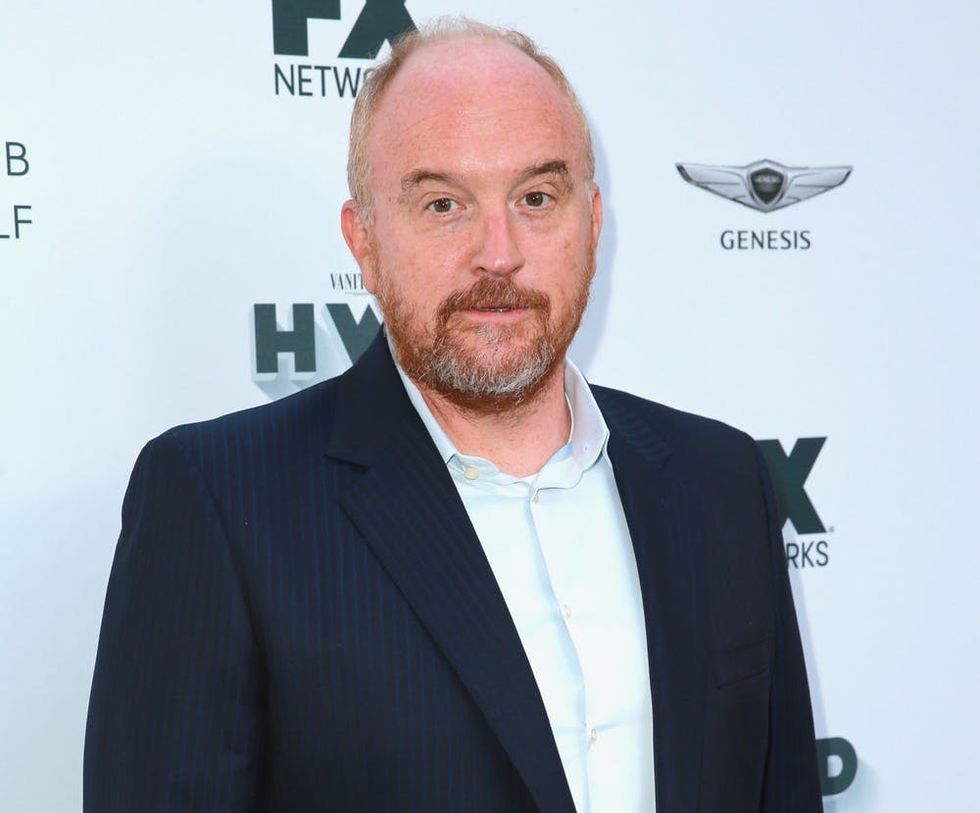This guy gets it.
It Took a (Male) Fellow Comedian to Sum Up Why Louis C.K.’s Return to Stage Is So Upsetting

On Sunday night, Louis C.K. made a surprise appearance at the Comedy Cellar in New York, his first onstage appearance since he admitted to sexual misconduct last fall. The New York Times reports that the actor-comedian took the stage around 11 pm, where he was greeted by a standing ovation from the venue’s roughly 115 audience members before he even delivered his set. Now, people are trying to process what the performance means and how to feel about it which — surprising to no one — turns out to be kind of messy.
According to the Times, C.K. performed a 15-minute set that another comic on the lineup that night, Mo Amer, described to the paper as “a wow moment.” The material was “like, classic Louis,” said Amer. “Really really good.” Club owner Noam Dworman said that a few people got in touch with him afterwards to express their appreciation for giving the disgraced comic a second chance but admitted that one audience member phoned Monday to say that he wished he’d known about C.K.’s appearance in advance so that he could have made a decision about whether or not to buy tickets.
“I care about doing the right thing,” said Dworman. But, he went on, “there can’t be a permanent life sentence on someone who does something wrong.”

As we inch closer to the one-year mark of the tidal wave that reignited Tarana Burke’s #MeToo movement on a global scale, we’re beginning to confront the kinds questions that can emerge when enough time has passed to dull initial blows. The most nagging of those questions, so far, seems to be: Is it ever okay to forgive and move on?
Comedian Michael Ian Black tweeted more or less to this effect, adding, “I don’t know if it’s been long enough, or his career will recover, or if people will have him back, but I’m happy to see him try.” His tweet has been liked over 4,000 times.
But as others like comedian Jen Kirkman have pointed out, the debate over a fallen star’s potential redemption isn’t necessarily the conversation we should be having — especially as men like C.K. and, reportedly, Matt Lauer, Charlie Rose, Mario Batali, and others look to rehab images tarnished by sexual misconduct allegations. And while many people on Twitter and elsewhere have been eloquent in explaining why, it was comedian Ian Karmel who laid out the implications in a way that any person — regardless of gender or life experience — should be able to understand.
“Louis CK being ‘banished’ from stand-up comedy wasn’t some kind of petty punishment,” tweeted Karmel, “it was a f*cking workplace safety issue.”
Karmel goes on to explain that stand-up isn’t a solitary line of work just because comics perform onstage by themselves. Comics hang around with other comics, and often in situations where there’s a huge power imbalance. When someone like C.K. is given “a slap on the wrist” for a documented history of predatory behavior, it “creates a climate that just isn’t f*cking safe for comedians, and especially comedians who are women — but also comedy club staff.”
Karmel’s five-tweet thread doesn’t write off the possibility of second chances, but the comedian argues that “it seems so obvious that we shouldn’t let these people back into our communities without them putting in a lot of work to get better.” (It’s worth mentioning that his thread has been liked nearly 35,000 times and counting.)
As #MeToo charges on, it’s important to remember that the movement isn’t just about retribution for individual abusers or even justice for survivors, but an effort to revamp our culture, together, in order to make spaces safe for everyone. Part of our challenge going forward will be figuring out what, if any, pathways might become available to outed perpetrators who genuinely want to make amends. But figuring out the fates of fallen stars is incidental to the process of creating change, not its central dilemma. After Louis C.K.’s return to stage, the question shouldn’t be whether it’s too soon for a comeback, but what message that comeback projects and whether it makes life better or worse for the people with less power to throw around who are watching.
(Photo by Rich Fury/Getty Images)


















